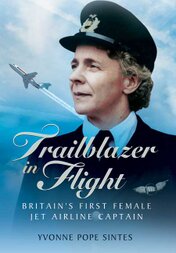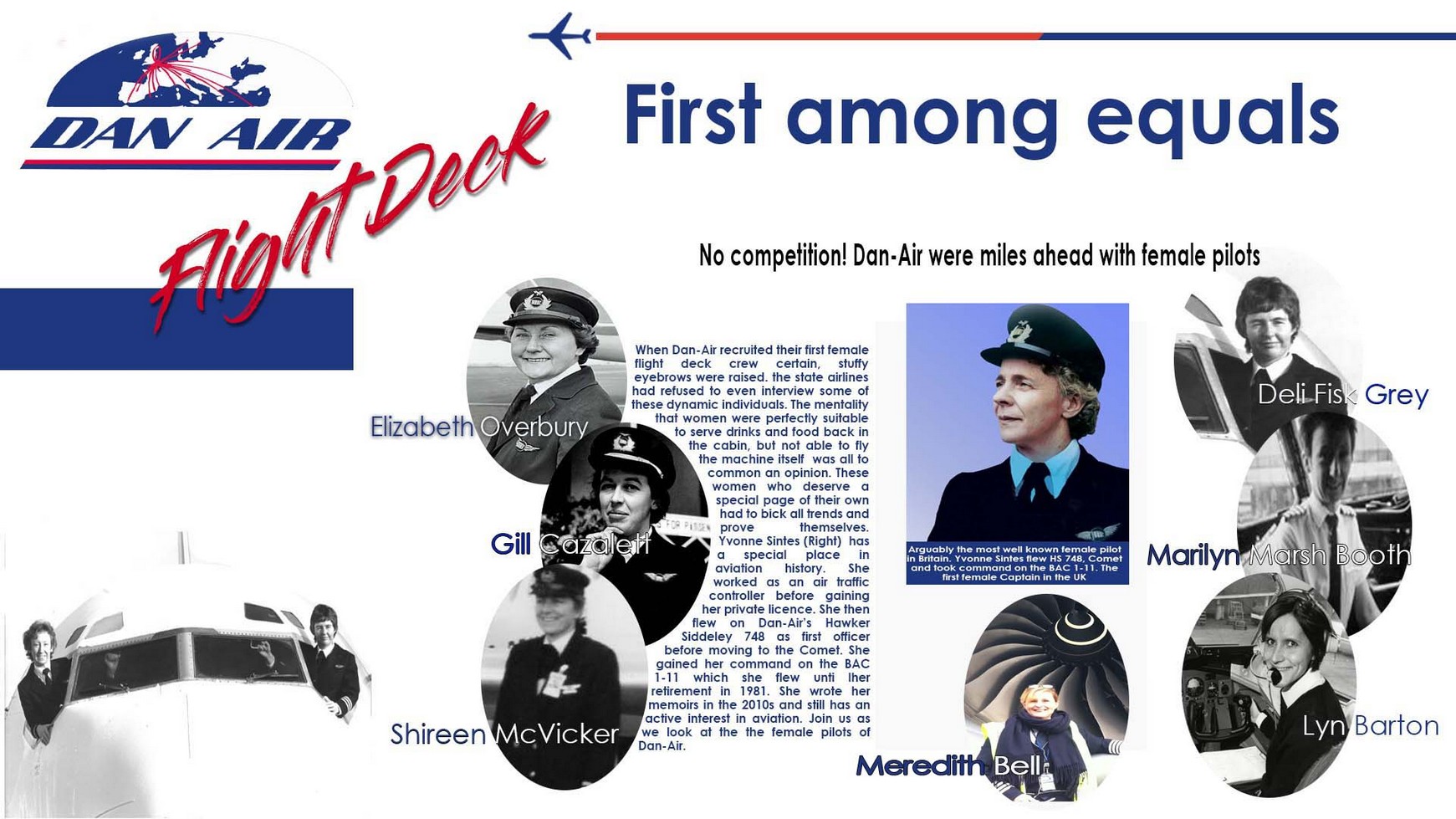
The Fascinating Story Of Dan-Air's Female Pilots....
Dan-Air's proud reputation for employing female pilots goes way back to the 1960s. It was the active policy of Both British European Airways and BOAC to not employ female pilots. Early pioneers at Dan-Air included Gillian Cazalet, who began her flying career in 1958 went on to to commercial service shortly afterwards flying De Havilland Dragon Rapides from Newcaslte. In 1962 Captain Cazalet lost her bearings near Manchester following an incident with an oil pressure valve. Capt Cazalet was on a flight with two officials from the Board of Trade when the pilot made the decision to land the aircraft in a field. No-one was harmed and the passengers praised her flying skills. Those early aviators belonged to an organisation called the Ninety Nine club. In recognition that they were not one of the 99% of pilots who were men! Other UK members included Elizabeth Overbury, Clare Roberts, Beryl Sanders and Yvonne Pope. The ladies, along with quite a few others regularly took part in exhibition, aerobatics and long-distance flying trials. The UK had earned a reputation for being among the first countries in the world to consider women for the flight deck. In Europe, besides the UK only Sweden had female commercial pilots. In 1960 Elizabeth Overbury, Yvonne Pope and Gillian Cazalet won the Lord Brabazon of Tara award for their air 'person' ship and Clare Roberts won the Air League Trophy in 1964. It took until 1968 before Gillian Cazalet was given the UK's first commercial pilot's licence, which gave her the right to fly any aircraft, including the VC10. The licence was not going to land her a job flying the big jets though, as we stated earlier, the large UK airlines would not even interview her - regardless of her ability. Skyways of London did employ Cazalet, where sh was employed as a First Officer on the prop-liner the Hawker Siddeley 748. Cazalet had been working as a nanny just ten years prior to this. After taking her first flight as a student she declared that she never wanted to do anything else. Unlike her male counterparts, Gillian's clothing and hair colour were mentioned by the press, who asked the ridiculous question 'Would she be wearing trousers or a skirt?' to which Gillian said she would wear a skirt, the press then went on to ask if it would be a mini skirt! Commenting on having a handbag in the flight deck Cazalet said 'A handbag in the cockpit is like seeing stockings in a bachelor's bathroom.' Cazalet had worked as a nanny, a petrol pump attendant and a home help in order to fund her flying lessons.
Yvonne Pope had been an Air Stewardess with Scottish Airlines before being absorbed into BOAC, who had a flying club where she began lessons. After that, she became the UK's first ever female to work in Air Traffic Control. sometimes working on Radar and sometimes in the actual tower. Pope said at the time; 'I was just really lucky to have the right qualifications and to be in the right place at the right time. Women are not usually given such responsible jobs. It's perhaps easy to see why men were favoured as an Air Traffic Controller is responsible for more people's live in an hour than a pilot of a VC10 is in a month.'
In 1965, having obtained her Commercial Pilot Licence, Pope secured work as a First Officer with Morton's Air Services flying Dakotas. It was claimed that Pope had the advantage over Cazalet in that she also held a licence as an instructor. First Officer Pope, who was a widow with two children, joined Dan-Air in 1968. She worked as a First Officer on the Dakota and Ambassador fleets before moving onto the Hawker Siddeley 748 where she gained command as a Captain. In 1970 she joined the Comet fleet as a First Officer. On 16th June 1975 she took her first command of a BAC 1-11 from Gatwick to the Greek Island of Crete's airport - Heraklion. She would go on to be Captain on the Comet, and aircraft she declared was her favourite. She claimed that the larger jets were easier to fly than smaller propellor driven types, as they 'are not so difficult to trim in the air.' The fact that Yvonne flew the Comet was ironic, given that BOAC and BEA had told her that women could not fly the aircraft. On being a woman pilot Captain Sintes (now remarried) says;
'I don't think sex comes into it. It is all about the individual concerned. What about all those women who flew,Spitfires, Mosquitoes and Dakotas from the factory to the airfield.
Elizabeth Overbury had started flying at a very young age, and had gained her instructor's licence when just 20 years old. She had, until 1969, held the record for being the youngest female pilot to hold an instructor's licence. She was the first woman in the UK to fly a 'prop-jet' on a scheduled service, and in 1968 she became the first woman to fly as a First Officer on a jet aircraft, when she was licensed to operate the BAC 1-11 with Autair International. After enjoying a pleasure flight when she was at boarding school, Elizabeth Overbury decided she wanted to be a pilot, she recalls;
'Flying lessons were so expensive. Each one cost £4 10s. In order to fund this I took on work as a trainee receptionist from 9am to 5pm. At 5:30 I was in the local cinema selling ice cream, then after that I went to work at a local petrol station. I received my licence and one of the first things I did was to take my mother on a flight. Imagine that, there I was with just 30 hours of flying time to my name taking my mother on a flight. She was dressed in these great big grey overalls with a mouth-piece so she could tale to me. She kept saying how people looked like ants, and trying to point out things that had caught her attention.'
Eventually Autair became Court Line and the company famously collapsed in 1973 leaving Overbury without a job. She re-located to Zimbabwe and began flying for the national carrier. It was at this time that she was approached by Dan-Air to become a Captain on their BAC 1-11 fleet. In 1986 she became the carrier's longest serving female pilot. She says;
'In this world, you can become anything you want, if you really fight hard enough, all my family, except perhaps my Brother, tried to put me off flying, but I kept at it, and in the end I got what I wanted, a Captain's job. There are times when things go wrong, and that is natural in thirty five years. But we as pilots are trained to get out of difficult spots. It is only afterwards when you are back on the ground that your knees start to knock, but pilots tend to not talk about those things. I once was grounded for a month because my handbag was stolen. It contained my passport and my pilot's licence and you cannot fly without them. It took a month for them to be replaced. Later that same day my car was broken into. The thieves took my pilot bag which contained all my pilot notes, which are useless to anyone but a pilot.'
Captain Overbury became a widow after just three years, when her test pilot husband was killed in an air accident. In 1986 she flew 630 hours, including 592 landings, the most stressful part of her job. With just three years to go until her retirement Elizabeth Overbury still had a few ambitions - to fly a Concorde or VC10. Which she said was very unlikely as Dan-Air didn't have the Concorde and the VC10 had been retired.
At her retirement she said that she would still fly the odd flight as a hobby, but was ready for a rest. 'What most people don't know is that pilots have to take eight exams every year, fail just one section of that and you are out. Aviation takes a lot of dedication, it is no good to be a woman pilot and taking a year off to have a baby. I have had all manner of experiences as a pilot, famous faces, streakers and even death. I have been very fortunate in being able to sort out most things. Maybe had I had a little more time with my husband I may have had a family, but it is something I have never really needed, and that has proved to be fortunate for me. Anyway, it meant that I had more time to dedicate to flying.'
In 1972 Delphine (Deli) Gray - Fisk, who 26, and Gillian Cazalet (35) were at the centre of a women's lib outrage when the two First Officers who were said to be 'at the top of the list for promotion to Captain' were overlooked and a male First Officer with less experience was granted Command. Fisk Grey's mother said 'Deli is very upset. The reason given for her 'none promotion' are preposterous. She was told that girls might not have sufficient control in the event of an emergency. But she is already sitting in the seat where she would have to take over if something went wrong.' Both the pilot's union B.A.L.P.A and the women's colleagues had backed them. with the union saying'We are against any form of discrimination at all.'
Delphine Gray - Fisk, who had been flying powered gliders since her teens had progressed into light aircraft by the time she was 22 was praised for her flying skill in 1968 when the twin engine propellor aircraft's engines cut out mid flight. Gray-Fisk had been giving instructions to a student when the incident occurred. She successfully landed the aircraft with both her and her student walking away unharmed. By 1970 Delphine had achieved her commercial pilot's licence. She had secured a job as a First Officer with Skyways, but her hopes of flying with a major airline, who operated jet aircraft, were dashed when BOAC announced that the cost of training a pilot for the Boeing 707 or VC10 was about £25,000 and that the airline was not prepared to pay that money out, with the risk that the pilot would then wish to leave should she become pregnant. The press sympathised with the airline! Saying that it was a valid argument, in that any female pilot may become 'romantically entangled' or having a home or a child would change their outlook on life. One newspaper said that 'Women's liberation is a just cause, but it cannot alter a woman's emotional and biological make-up'.
One member of Parliament, Norman Tebbitt, who was himself a former airline pilot, slammed British European Airways in 1971 for 'a blatant sexual bar' on Delphine Gray-Fisk, when BEA refused to interview Gray-Fisk when she applied for a job with the company. BEA said it was 'not their policy to employ female pilots'. Tebbit then went on to say; 'We must face the fact that there is basic equality in sexes. the very least the airline should do is to consider an applicant as person qualified as a pilot rather than as a girl.'
It wasn't only BEA who turned her down, the largest UK airline, BOAC also refused to interview her. She said;
'The big airlines think that they will spend a lot of money training women, then they will walk out and get married. But their policy is invalid, I don't intend to get married in the near future, and anyway, I can fly until I am 65.'
The airline was unrepentant at the time, saying; 'We may sound old-fashioned, but perhaps we prefer women to be home, not as pilots - there is a dividing line over what men and women do.' The British Airline Pilots' Association, who had just six women as members, blasted BEA saying; 'We do not try in any way, to influence an airline as to whom they employ, but clearly discrimination against someone because she is a woman is clearly deplorable.'
Walter Huntley, was a columnist for the Liverpool Echo, one of the UK's leading regional newspapers, outrageously went as far as to say that 'I am sure there are women pilots such as Delphine Gray-Fisk, who may be mechanically orientated and be splendid pilots, but by nature, I am not one of life's flyers, and I would rather they be on some other plane than the one I am flying on. It would not do my equilibrium any good to see a chic little blonde to go mincing out across the tarmac, and disappear, with a show of nylons, into the cabin to take over the controls. I would imagine, that at any point in the flight, she might appear, flash her eyes appealingly at the passengers and say 'anyone here ever flown a VC10.' - * Webmaster's note 'the fact that anyone had these thoughts and then wrote this drivel, is beyond appalling. It doesn't take a genius to see how easily it could cause offence. His view, even in a comedic guise, that a woman would have to be 'a chic little blond' and walk with a 'mince' is deeply offensive. Added to the notion that that she might 'disappear into the cabin, with a flash of nylon', shows ignorance too. Airlines had always referred to the area pilots work as either a 'cockpit' or 'flight deck' - has this dreadful man never heard of women's trousers? Even if they were to wear a pair of nylon tights, would this detract from their ability to fly an aircraft? The notion that this, supposedly dumb bimbo of a pilot might have to resort to 'flashing her eyes' to attract passengers' attention is grotesque. The final insult was that this woman would have to enquire whether her passengers were able to fly a VC10 jet. Only one of the people was in a position to fly the said aircraft - and it was not Mr. Huntley. The woman who Huntley so cruelly ridiculed, was a competent pilot who was being actively thwarted in her ambitions to progress onto larger airliners. This lamentable article only served to consolidate the retrogressive attitude held by BEA and BOAC. There was a storm of protest that followed Huntley's article. Now on the back-foot after the backlash, this fountain of sexism wrote a follow-up 'article' for the newspaper, in which he said 'Feminine feelings has been bursting forth over Delphine Gray-Fisk, the 25 year old smasher who BOAC turned down for a job.' He claimed that the whole thing had got 'hysterical' and wanted to put his view objectively. He said; 'I wouldn't want to fly with a woman pilot at any price.' before stating; 'But this has nothing to do with sexual discrimination - The words we bandy about these days!!!' (His exclamation marks) It was, he said, merely that he was not one of life's flyers. In which case, surely he would not want to fly with ANY pilot. He said that he knew all about the statistics of safety in the air, that you were safer at 35,000 feet over the Azores than when you are sat in your front room. He felt, however, that if things did go wrong, that you had more than the drop of an armchair to fall. He argued that he was a 'worry guts' and that if he was aboard an aircraft, sat near the wing, and spotted holes, where there should be nuts and bolts (*Webmaster note -I am not making this up) he then has his eye on that hole for the rest of the flight. If he saw that the stewardesses were full of 'confident poise' then they would be 'putting on an act to hide the drama unfolding in the cabin.' (Mr. Huntley - it is YOU in the cabin, the pilot is in the flight-deck.) Huntley said that on one flight, the Captain walked down the aisle mid-flight, enquiring about the well-being of passengers, only to be asked 'Who's flying the aircraft?' The Captain assured passengers that the autopilot was on, and that it did a better job than the pilots. Huntley was not reassured by the Captain's word. All of Mr. Huntley's light hearted words did not hit a re conciliatory bone in the body. In fact, he went on to point out that 'Women, I think, are sometimes blinded by the wonders of mechanics. There is one lady I know who overlooks the fact that for all its sophistication a car still needs petrol to help it get along. There is another lady of my acquaintance, who tried to drive the car out of the garage after her husband had taken the battery out of the car to put it on charge. - 'But it was daytime,' she explained 'I didn't need the lights.' Huntley had other similar tales, but prudence restrained him. Thankfully, views held by the likes of Huntley would never be published in today's press.
Delphine Gray-Fisk had logged more than 400 flying hours before being rejected by BEA. This shows a true determination, in no small part because Fisk-Gray had to finance her own certification, as did others, like Elizabeth Overbury, who held three jobs in order to pay for lessons. This commitment in itself is worthy of praise. In many cases, men had the luxury of serving in the RAF, where training was given for free. The few who were wealthy could afford to pay their way to obtaining wings. Not all women would wish to leave a job to have a family. What about lesbian women? Or those who simply had no desire to be a parent, or where one half of a couple were unable to conceive? Pilots have always been well-paid. It is not at all uncommon for pilots to have children in boarding school, or to have a paid nanny to assist with child care. Why did this journalist and the two airlines choose to ignore this? Women were not paid the same wages in most jobs until Government legislation forced employers to do so. The struggle of these women really does show how determined they really were.
Whilst Dan-Air were boasting that 'We already have women pilots, who have flown thousands of holiday-makers to the sun. We also employ another female Captain besides Delphine, so the facts speak for themselves.' but the facts didn't as far as BEA and BOAC were concerned. They droned on; 'We don't employ women pilots because we think it's a man's job. We don't feel that they'd do it as well as a man, and many people would not be prepared to get onto a plane that was piloted by a woman.'
By 1973 Delphine Gray-Fisk had moved to the Comet fleet as a First Officer and soon after she took control of the Boeing 727. Dan-Air had the distinction of being the first airline to have an all female compliment of pilots when Yvonne Sintes-Pope and Marilyn Marsh-Booth flew the first all female crew, this was furthers when Delphine Gray-Fisk and Marilyn Marsh-Booth became the first jet airliner to have an all female pilot crew, the aircraft being the The Boeing 727.
Marilyn Marsh-Booth was born in West Yorkshire in 1946. Her parents ran a fish and chip shop. Marilyn attended Grammar School but says she was 'sufficiently disinterested in more study' and turned down the offer of a free university place. Soon after she had left school, her Mother found her a job in an office - which she hated. Marilyn had no idea what career she wanted to pursue, other than she wanted to travel. She thought the obvious thing to do was to become an air hostess. She was taken on by Britannia Airways and later Dan-Air. She was flying as cabin crew in the early 1970s when she was invited into the flight deck. She says that; 'I was blown away by the speed, the power, and that is what sold me. I thought I am going to become a pilot.' Marilyn was not from a privileged background and knew it would be a tough journey. Whilst at Dan-Air, Marilyn Marsh Booth met the airline's chief pilot Captain Bob Atkins, who had been in post since 1963. Marilyn describes Atkins as a 'non-traditionalist' in a traditionalist world. She credits his influence as the reason she obtained a scholarship to Oxford Air Training School, she recalls; 'Sponsoring a woman was totally unheard of, but his belief that it didn't matter if you were male or female as long as you did the job, it was the catalyst I needed to start my career. I apparently love to strive for the unachievable, which it was at that time.'
Marilyn joined Dan-Air as a First Officer on the Hawker Siddeley 748 before moving onto the Comet fleet. The Comet was eventually retired from service in 1980 and Marilyn Marsh-Booth joined the Boeing 727 fleet. Those around her knew that it was especially difficult for women to gain entry to the flight deck; 'It was, of course, but at that time I just didn't really see it, I just forged ahead, saw a goal and forged my way ahead. You know, if there was a barrier, I was was just going to get through it, because I love a challenge. When i was taken on by Dan-Air there were other female pilots, but for the first three years they just wouldn't let us fly together. I think...well, their excuse was; if anything happens, think of the publicity....it will be terrible. So, we didn't fly together for three years, and when we did, everyone was, like 'well let's celebrate, everything was amazing,' - But no no Dan-Air wanted something low key. Nothing was said, it was just a normal flight, and that was the beauty of Dan-Air, we were pilots, we weren't male pilots or female pilots, we were pilots. Dan-Air didn't make a big deal of it, but when we did the first flight, it was to Berne is Switzerland, and when we got there there was a full brass orchestra, there were bears of Berne and we were given big bunches of flowers.'
Marilyn emigrated to Australia where she began career with Sunbird Airways before joining Ansett Australian Airlines where she flew the Boeing 727 until she retired. As of 2024, Marilyn has written a stage play 'Higher Faster Louder' which is based on her life in aviation. The show premiered in 2023. She is currently writing her memoir.
Shereen McVickar was a BAC 1-11 pilot, after the demise of Dan-Air became a founding director of a start-up airline, Europe Elite. By 1995 she was flying Boeing 757 jets out of London Heathrow to Kazakhstan & Uzbekistan. Several ex Dan-Air staff were involved but, sadly, the full funding never materialised and the carriers folded.
in 1997 Delphine Gray-Fisk became involved in politics. She stood in 2001, 2005 & 2010 UK General Election as a candidate for UKIP
Delphine (Deli) Gray Fisk told us recently;
'I have just discovered with delight your website. I'm delighted to see a photograph of Elizabeth Overbury, who taught me to fly at Luton flying club, where I gained my PPL in 1963. After 7 hours instruction, she got out of the Auster J1N at the end of the grass runway and calmly said,”I'm getting out here to have a smoke. Take the plane up, and I'll be waiting here for you to come and pick me up.” Luckily, everything went without mishap. I was also pleased to meet
Robin Apthorpe told us; 'I was fortunate to meet Clare Roberts at Luton airport, about whom you ask for more information. She and her husband kept the Chris Air De Havilland Dragon there for a while. I think there was some reason why Chris couldn't fly the plane, so it was Clare who flew it. Again, in 1963, she flew me and Chris as sole passengers from Luton to the Rochester airshow, and back again at the end of the day. All this is recorded in my flying logbook, and I also have a colour photograph of us together in front of G-ADDI. A photograph the aircraft also appeared in The Times newspaper, when a light aircraft crashed at Rochester behind it.
Two video clips of Captain Elizabeth Overbury
ELIZABETH OVERBURY
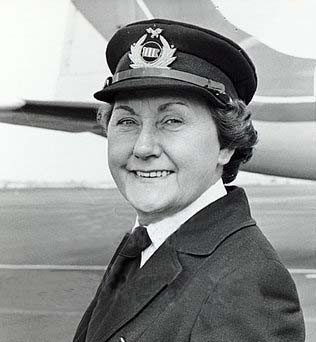
DELPHINE (DELI) GRAY - FISK
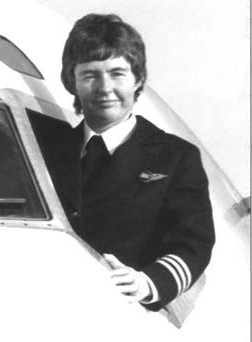
YVONNE POPE (SINTES)
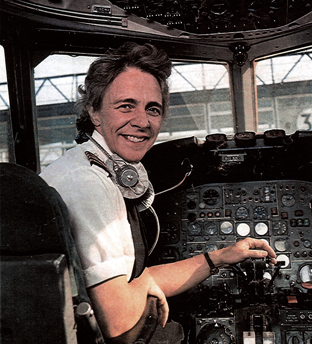
MARILYN MARSH - BOOTH
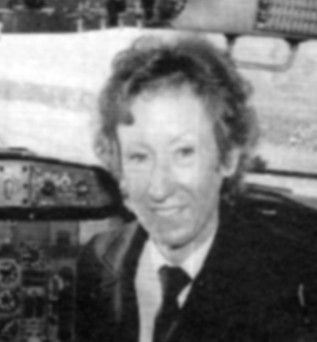
BIOGRAPHY
Elizabeth Overbury
Elizabeth Gained command on the HS 748. She began her career working for Autair on their fleet of the same type. To gain her pilots licence she worked three jobs. Autair later became Court Line where Elizabeth stayed until the company collapsed in 1974. She then joined Dan - Air flying the HS 748
BIOGRAPHY
Delphine began flying as a child. Initially as a glider pilot where she broke records by flying solo and obtaining her PPL at 18 years old. Her Commercial Pilot's Licence was obtained at just 19 years old and her ALTP at 22. Deli was the deputy CFI at Thurston Aviation. She joined Skyways, on the HS 748. In 1970 Where she gained command of the type. Deli was promoted to the Comet fleet, and in 1974, the Boeing 727. She stayed with Dan - Air until the BA takeover. Deli was one of the main campaigners in the legal battle for compensation.
BIOGRAPHY
Yvonne Pope (Sintes)
Yvonne Originally worked as cabin crew for BOAC in the 1950's, she started flying through membership of the Airways Flying Club and also joined the RAF Volunteer Reserve. She became a full-time flying instructor after her first husband died, leaving her with two young boys to bring up. A spell as an Air Traffic Controller at London Gatwick followed. Yvonne eventually joined Morton Air Services (then a BUA subsidiary) as a pilot on DC-3s. This eventually led to captaincy. Yvonne left Morton's shortly before they were fully absorbed by British United, to join Dan-Air. Initially flying in DC-3s and Ambassadors. She moved to jets when she trained on the Comet fleet. Yvonne gained her captaincy on 748's in 1970. Eventually Yvonne gained command on the Comet. She became the first woman in Europe to fly as a Captain on a Jet Aircraft. She also gained command on the BAC 1-11.
BIOGRAPHY
Marilyn Marsh - Booth
Marilyn began her career as an Air Stewardess on Britannia airways. She trained as a pilot at the Oxford Aviation Academy and joined Dan Air as a First Officer on the 748s. She often worked with Yvonne Pope so, All-female crews were common place with Dan - Air even back then. Marilyn went on to fly the Comet. After Dan - Air Marilyn emigrated to Australia where she worked with Sunbird Airways and Ansett Australian airlines. She is now retired.
CLARE ROBERTS

LYN BARTON

SHIREEN McVICKER
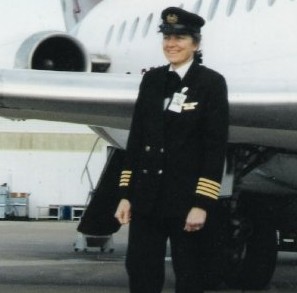
GILL CAZELETT
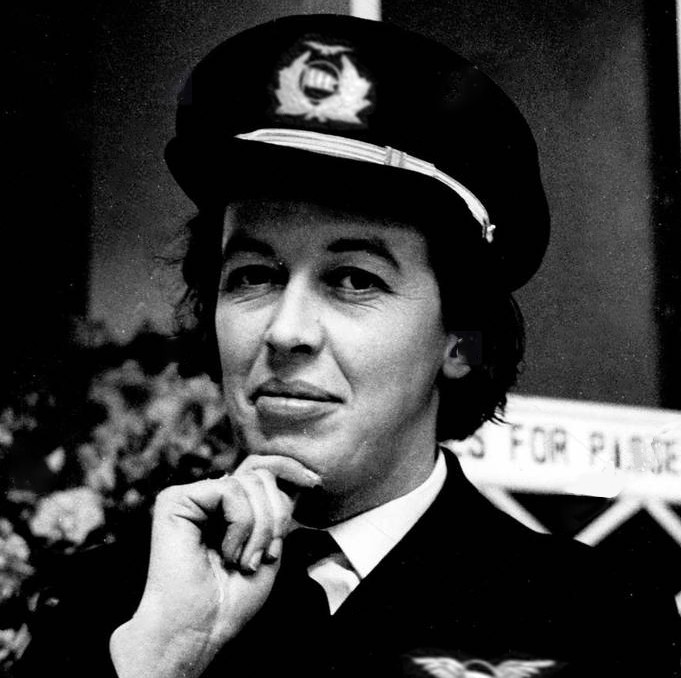
BIOGRAPHY
Clare Roberts
We are looking to find more about Clare. In 1966 she was flying cattle for Dan-Air on a part time basis. She was a first officer on the Dakota fleet at that time. We have discovered that she also had the distinction of flying miniature horses from Sardinia. As a freelance pilot she worked on the De Havilland Dragon. Her work involved aerial photographic work. Clare's Husband, Chris, was also a pilot who formed a charter airline; 'Chrisair'. The couple flew alongside each other on this start-up carrier from Kent. If you have any more details please contact us
BIOGRAPHY
Lyn Barton
Captain Owen Smith writes:
'I remember her name but never flew with her as I believed she left before I joined Dan-Air and I started on the BAe HS 748 Night Mail flights as a Flight Load master in 1989. Lyn Barton moved over to British Airways before I joined Dan Air in 1989. She was flying a leg as the relief F/O on the B747 fleet.'
If you are Lyn, or have any more information - Please let us know.
If you are Lyn, or have any more information - Please let us know.
BIOGRAPHY
Gill Cazelett
Gill hails from Ireland and began flying as a young woman aged 20 . Initially her flying was on the Tiger Moth! After gaining her Private Pilots Licence 1957. She flew tourists around Bournemouth on pleasure flights for her first job flying. It was in 1957 that she entered the Christchurch Aero Club National Air Race. She was beaten at the last mile by another female pilot Sheila Scott. He next job was with Tyne Tees Air Charters flying Rapides and Austers. A car accident meant Gill was unable to fly. So she used her time to working as a petrol pump attendant to pay for further training. She then joined Hunting Clan on the DC 3. She flew with Gregory's before joining Skyways on the HS 748. Dan - Air's subsequent take over of Skyways saw her work with Dan Air until her retirement.
MEREDITH BELL
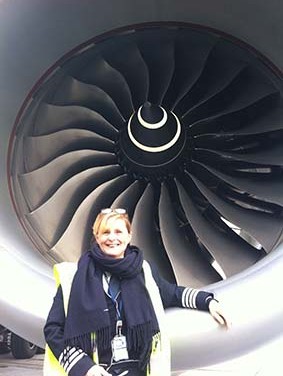
BERYL SANDERS

BIOGRAPHY
Meredith Hill / Forman
Flew the BAe HS 748 fleet when she was a young F/O. She is married now and is now known as Meredith Forman. She went on to became a training Captain with British Airways She left the 748 fleet and went on to fly the B737-400s.
BIOGRAPHY
Beryl Sanders,
Beryl Sanders had been flying for many years, leading up to participation in the taking part in the World Aerobatic Championship, alongside another female pilot, Sheila Scott. In the 1960s Beryl obtained her commercial pilot licence and was flying what was described as 'medium sized' aircraft for Dan-Air. In 1967 Beryl was giving instructions to a trainee pilot on a Tiger Moth aircraft when the aircraft crashed near Redhill. The student crawled from the aircraft with just a broken leg. Beryl was severely brain damaged and was admitted to hospital at Oxford. Incredibly, Beryl spent eight years in hospital, before passing away in April 1975. Beryl lived in Hungerford with her Mother and Sister.
SARAH SPIERS

BIOGRAPHY
Sarah Spiers joined Air UK and then Dan-Air where she was a First Officer on the HS 748 fleet
After Dan-Air folded Sarah went to British Airways where she was Senior First Officer on the Boeing 747
She retired from BA. Sarah died peacefully at home in Dorset in early July 2024 aged 65
Sarah was a force of nature and approached life with enthusiasm and energy. Although her life took a different direction after leaving BA there will be many here who remember fondly.
BIOGRAPHY
Shireen McVicker
A brief look at Shireen's biography will tell you that she has had an incredible life. After joining Dan - Air as a First Officer she went on to command the BAC 1-11 and Boeing 737. After the demise of the airline she went on to British World Airways where she worked as the Flight Safety Officer on the BAC 1-11 from 1993 to 2004. After that she went to Jet2 where she flew the Boeing 737 for a further two years. Shireen had a complete change of career in 2006 when she decided to train to become a Doctor of medicine. She trained for this at St. George's University in in America. She now d for the NHS in the UK
KATE HENWOOD

BIOGRAPHY
Kate trained with British Aerospace before joining Dan-Air on the HS 748 as a First Officer.
We do not have any more information about Kate - if you can help fill in the gap - Contact Us Here
THE MARILYN MARSH BOOTH GALLERY
THE YVONNE POPE SINTES GALLERY
ORDER THE YVONNE POPE SINTES BOOK
Yvonne Pope Sintes has written her autobiography. It was published in 2015 and is available from Amazon click here to purchase (Site opens in a new window)
Explore These Sections About Dan-Air People
DISCUSS THIS SUBJECT
0
reviews
